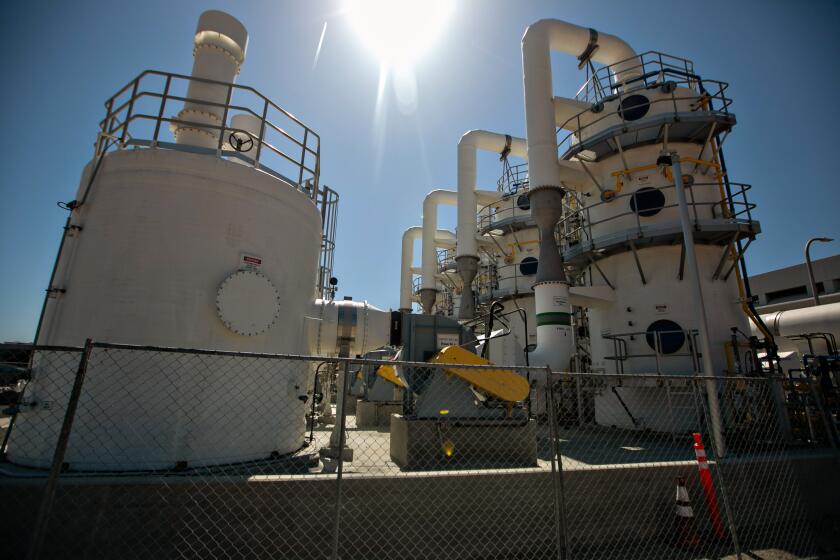PERSPECTIVE ON TRADE : Hard Line on China Has Heavy Cost : A normal U.S.-Chinese relationship--’most favored nation’ status--would serve our interests and their democratization.
I share the concerns about human-rights issues, trade problems and proliferation questions involved in U.S.-China relations. However, I strongly believe that denying or restricting most-favored-nation status would not solve these problems; in fact, it would make their solution more difficult.
The first and most obvious impact of denying MFN to China would be serious damage to China’s economy. The sectors hurt the most would be the market-oriented and export-oriented collective and private enterprises that constitute China’s most dynamic elements and are the strongest base for reform--especially those in the coastal areas, which are well on the road to integration into the international economy.
On the U.S. side, consumer interests would suffer as a result of rising prices for the kind of low-cost consumer goods imported from China. American grain farmers and producers of civilian aircraft, fertilizers and chemicals would also be adversely affected by reduced sales.
More important, however, would be the possible effect on broad American political and strategic interests. The conventional wisdom today seems to be that China has little, if any, relevance to those interests. This reflects a shortsighted view of both U.S. interests and China’s role in the international community. Because China is the largest, most centrally located and militarily the strongest indigenous power in Asia, deteriorating relations with it could seriously complicate the pursuit of many American goals.
China’s policies will continue to be a major factor influencing prospects for stability on the Korean peninsula, which remains the most dangerous flash point in the world. In recent years, Beijing’s policies have generally paralleled those of the United States and have contributed to stability in Korea.
Chinese cooperation is also a prerequisite not only for ending the conflict in Cambodia but also for stabilizing the entire Indochina peninsula. Throughout East Asia, in fact, the prospects for stability could be adversely affected by denying China’s MFN status.
One of the most important questions to ask about the consequences of such action, obviously, is what effect it will have on future economic and political trends in China itself. Instead of encouraging a return to moderation, economic reform and political liberalization, it is likely to have the opposite effect.
Since the late 1970s, China has been undergoing a dramatic transformation, a “second revolution.” Throughout the 1980s, until its economic crisis of 1988 and its political crisis of 1989, China was in the forefront of economic reform in the communist world and was the leader among developing countries in growth. Despite the setbacks of the last two years, China is still far ahead of other communist countries in its progress toward economic reform.
Political change was considerably slower than economic change in the 1980s. However, there were more significant changes than is often recognized, and these altered the political climate. Political controls were relaxed; the force of ideology declined; the role of the party was reduced; the flow of information through modern communications and the media increased greatly, and open debate was tolerated.
The crisis of 1988-89 was in large part the product of these changes. The side effects of reform created serious problems. Rising inflation, growing corruption and increasing inequities created widespread dissatisfactions and social unrest. In late 1988, the regime adopted an economic austerity program designed to bring inflation under control--which it did, but at the cost of exacerbating many other causes of dissatisfaction. Rising expectations outpaced even the rapid rate of growth, and the loosening of controls made the expression of discontent possible.
All of this led to the student protests in 1989. Debate over how to respond split the leadership and culminated in the clampdown and Tien An Men massacre in June.
During the past two years, conservative hard-liners have tried to recentralize the economy and repress political dissent. What is striking, however, has been how limited the effects of the clampdown have been: There has been no basic reversal of economic reforms; it has simply not been possible even for conservatives to turn back the clock. Although tighter political control has inhibited open expression of views, the Chinese privately ignore the re-indoctrination and state their opinions with remarkable frankness.
China today is a country in transition, holding its breath, waiting for the party elders to pass from the scene. A key question for U.S. policy is whether, in light of the current situation and forces at work in China, an attempt to exert strong external pressure on the current Chinese leadership by ending MFN status or attaching significant conditions to it would enhance near-term prospects for more active economic reform and political liberalization, or lead China’s leaders to dig in their heels and harden their policies.
Almost certainly it would be the latter, and the consequences would delay rather than accelerate reform.
Regarding the proposals to attach strong conditions to MFN, the Chinese leaders would probably consider this as tantamount to a decision to deny MFN entirely next year, and react accordingly. I also believe that many American businessmen would react the same way and begin to pull back from involvements in China.
The United States will serve its own interests best if it continues to grant most-favored-nation status to China, without conditions. We should attempt to maintain a normal relationship, while at the same time vigorously pursuing our human rights, trade and non-proliferation goals through diplomatic, legal and other means. What is essential is that we avoid endangering our basic relationship.
More to Read
Start your day right
Sign up for Essential California for news, features and recommendations from the L.A. Times and beyond in your inbox six days a week.
You may occasionally receive promotional content from the Los Angeles Times.






